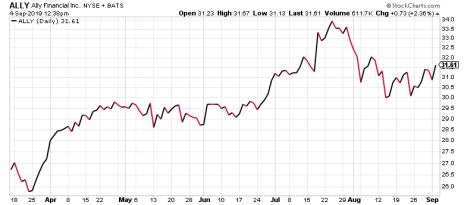U.S. Economic Growth Remains Strong. And this Mid-Cap Financial Stock is Taking Advantage of that Growth.
Today, I want to tell you about Ally Financial stock. But first, a word about the current financial climate…
The U.S. economy continues to chug along, as measured by a relatively uninterrupted stream of encouraging milestones: employment is at record levels; wages are rising; the Consumer Confidence Board’s Present Situation Index is now at its highest level in nearly 19 years; the Chicago Purchasing Managers’ Index (PMI) increased nicely in August; the Equipment Leasing and Finance Association’s (ELFA) Monthly Leasing and Finance Index reported that U.S. companies’ new business volume rose to $9.4 billion in July, up 15% from a year ago; used car prices are high; and both GDP and inflation are near 2.0%.
[text_ad]
We know that U.S. consumers and businesses benefit from all this good news, so let’s focus on a financial business that directly interacts with both of these powerful market forces.
Ally Financial Stock
Ally Financial Inc. (ALLY) is a leading digital financial-services company with $180.4 billion in assets. Ally provides automotive and equipment financing and insurance to consumers, middle-market companies and municipalities. In addition, Ally Bank – an all-digital internet bank – offers mortgage-lending services and consumer banking; and Ally Invest offers securities-brokerage and investment-advisory services.
This week, Ally Bank announced that they surpassed $100 billion in retail deposits from a base of 1.9 million customers. In the first half of 2019, deposits grew by $9.5 billion and the customer count grew by 200,000. Ally’s competitive edge is their policy of no monthly maintenance fees or minimum balance requirements on deposit accounts.
CFO Jennifer LaClair will present at the Barclays Global Financial Services Conference on Monday, September 9. Investors can tune in to the webcast on Ally Financial’s Investor Relations webpage.
Ally reported a successful second quarter in July, with profits coming in higher than the forecasts of 17 Wall Street analysts. Remarkably, despite the media’s relentless cry of “recession!”, Ally’s net charge-offs declined for six consecutive quarters. In fact, net charge-offs will likely finish 2019 lower than management’s guidance range of 1.4%-1.6%. It doesn’t make sense that consumers’ ability to pay their bills would improve as a recession approaches, so clearly, one of those sources is not providing reliable information.
Wall Street’s full-year earnings projections keep moving higher as the months pass. At this point, analysts are expecting earnings per share (EPS) to rise 11.4% and 12.6% in 2019 and 2020. The current price/earnings ratio (P/E) is 8.3, reflecting a moderately low stock valuation.
New Current Expected Credit Loss (CECL) rules will affect Ally Financial and other companies that loan money – banks, credit cards and more – beginning in January 2020. Many companies will be required to increase reserves to cover future loan/receivables losses. Some companies, including Ally, already have sufficient capital and are not expected to take an earnings hit relating to CECL.
ALLY is a mid-cap stock with a very high degree of institutional ownership. In 2017 and 2018, the company had a pattern of raising the dividend payout every six months; a pattern that was interrupted in July 2019 when the prior quarter’s payout remained intact. The current quarterly payout of $0.17 per share yields 2.2%.
Buy ALLY Now
ALLY is an appropriate stock for growth & income investors, investors who prefer rising dividends, and traders who would be happy with a 20% capital gain over the course of the next 3-12 months. Ally Financial stock rose above an 18-month trading pattern at the end of June, reaching a new all-time high of 34 in July, then pulled back a bit with the August stock market correction.
This is a perfect time to buy, as ALLY stock has just begun what will likely be a new run-up toward the upper 30s.
Now, if you want to know what other growth and value stocks I’m currently recommending to my Cabot Undervalued Stocks Advisor subscribers, click here.
[author_ad]


